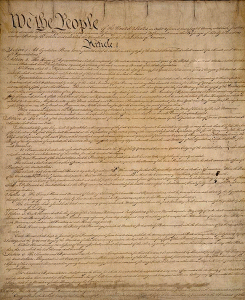 Twenty-four hours and I’m changed. Not radically, and not necessarily in a more optimistic direction, but thoughts have settled and I’ve reached some conclusions, as well as realized additional concerns.
Twenty-four hours and I’m changed. Not radically, and not necessarily in a more optimistic direction, but thoughts have settled and I’ve reached some conclusions, as well as realized additional concerns.
If the issue was purely freedom of expression, the court had no choice but to make the decision it did. The First Amendment is just that — the first. Prima. It’s the basis of all the other amendments and freedoms we enjoy. If one is going to shut down a corporation’s right to free speech, what about newspapers, which are also corporations? There’s no sensible way to draw the line.
All of this leads me to a deeper concern. The idea has crossed my mind before, but Citizens United is making it seem all the more relevant: our eighteenth-century constitution is not always ideally suited to the challenges of the twenty-first century.
One of the most famous, if not most eloquent, pleas for freedom of speech is Milton’s “Areopagitica,” yet that excellent example of persuasive writing is deeply flawed. I’m not simply referring to the narrow freedom of speech for which Milton argues: “Papists” are denied the right as if it were as natural as denying free speech to boulders. Instead, I’m referring to Milton’s contention that there was no censorship in classical times. He’s right, but what was there to censor? There was absolutely no means of mass communication in Socrates’ Athens: he was many centuries removed from a printing press. Thus, it is disingenuous of Milton to make a comparison between the age of Socrates and seventeenth-century England. Regarding communication and potential censorship, there are almost no similarities between the two ages. Specifically, there was virtually nothing to censor in classical Greece compared to Miltonian England.
Similarly, there are very few similarities between twenty-first century America and colonial America. Communication with the entire citizenry now is instantaneous; in the Framers’ day, it took days. There was nothing like the “too big to fail” corporations that exist today, and with the possible exception of some trading companies, multi-national corporations were nonexistent.
Had such things been the eighteenth-century reality, would the Framers have created the same constitution? Most probably not. And it might be a good thing that the internet and General Electric were not the reality: the Constitution is remarkable for its brevity, and I highly doubt modern politicians could match it, or even come close.
Still, that brevity is due in large measure to the relative simplicity of the times. Occasionally, I think it comes back to haunt us.
We have an option: the Framers were wise enough to see the need for an evolving document. We can pass new amendments but those are few and very far between. Peter Shane at the left-leaning Huffington Post has already created a first draft for just such an amendment:
Sec. 1. Notwithstanding any other provision of this Constitution, Congress may prohibit or otherwise regulate political contributions and expenditures by commercial, for-profit corporations for any federal office.
Sec. 2. Notwithstanding any other provision of this Constitution, States may prohibit or otherwise regulate political contributions and expenditures by commercial, for-profit corporations for any state or local office, or for any state or local referendum or initiative, within their jurisdiction, and may delegate such regulatory. (Huffington Post)
Amending the First doesn’t seem wise or even feasible. But what about a 14th-Amendment style definition of personhood? The Fourteenth Amendment was designed, in part, to overrule the Dred Scott decision of 1857. It sets forth the very broad conditions of citizenship:
All persons born or naturalized in the United States, and subject to the jurisdiction thereof, are citizens of the United States and of the State wherein they reside. No State shall make or enforce any law which shall abridge the privileges or immunities of citizens of the United States; nor shall any State deprive any person of life, liberty, or property, without due process of law; nor deny to any person within its jurisdiction the equal protection of the laws.
Couldn’t we do something similar? After all, every contract in America begins by defining all the terms in the contract. Shouldn’t the Constitution have something similar?